Financial News
Belden (NYSE:BDC) Beats Q3 Sales Targets

Electronic component manufacturer Belden (NYSE: BDC) reported Q3 CY2024 results topping the market’s revenue expectations, with sales up 4.5% year on year to $654.9 million. The company expects next quarter’s revenue to be around $652.5 million, close to analysts’ estimates. Its non-GAAP profit of $1.70 per share was also 5.6% above analysts’ consensus estimates.
Is now the time to buy Belden? Find out by accessing our full research report, it’s free.
Belden (BDC) Q3 CY2024 Highlights:
- Revenue: $654.9 million vs analyst estimates of $643.7 million (1.7% beat)
- Adjusted EPS: $1.70 vs analyst estimates of $1.61 (5.6% beat)
- EBITDA: $112.5 million vs analyst estimates of $106.6 million (5.6% beat)
- Revenue Guidance for Q4 CY2024 is $652.5 million at the midpoint, roughly in line with what analysts were expecting
- Adjusted EPS guidance for Q4 CY2024 is $1.67 at the midpoint, roughly in line with what analysts were expecting
- Gross Margin (GAAP): 37.3%, down from 38.5% in the same quarter last year
- Operating Margin: 11.5%, down from 15.2% in the same quarter last year
- EBITDA Margin: 17.2%, down from 18.4% in the same quarter last year
- Free Cash Flow Margin: 14%, similar to the same quarter last year
- Market Capitalization: $4.80 billion
“I am pleased that our team continues to navigate this dynamic environment and delivered another solid quarter,” said Ashish Chand, President and CEO of Belden.
Company Overview
With its enamel-coated copper wire used in WWI for the Allied forces, Belden (NYSE: BDC) designs, manufactures, and sells electronic components to various industries.
Electronic Components
Like many equipment and component manufacturers, electronic components companies are buoyed by secular trends such as connectivity and industrial automation. More specific pockets of strong demand include data centers and telecommunications, which can benefit companies whose optical and transceiver offerings fit those markets. But like the broader industrials sector, these companies are also at the whim of economic cycles. Consumer spending, for example, can greatly impact these companies’ volumes.
Sales Growth
A company’s long-term performance can give signals about its business quality. Even a bad business can shine for one or two quarters, but a top-tier one grows for years. Regrettably, Belden’s sales grew at a sluggish 1.9% compounded annual growth rate over the last five years. This shows it failed to expand in any major way, a rough starting point for our analysis.
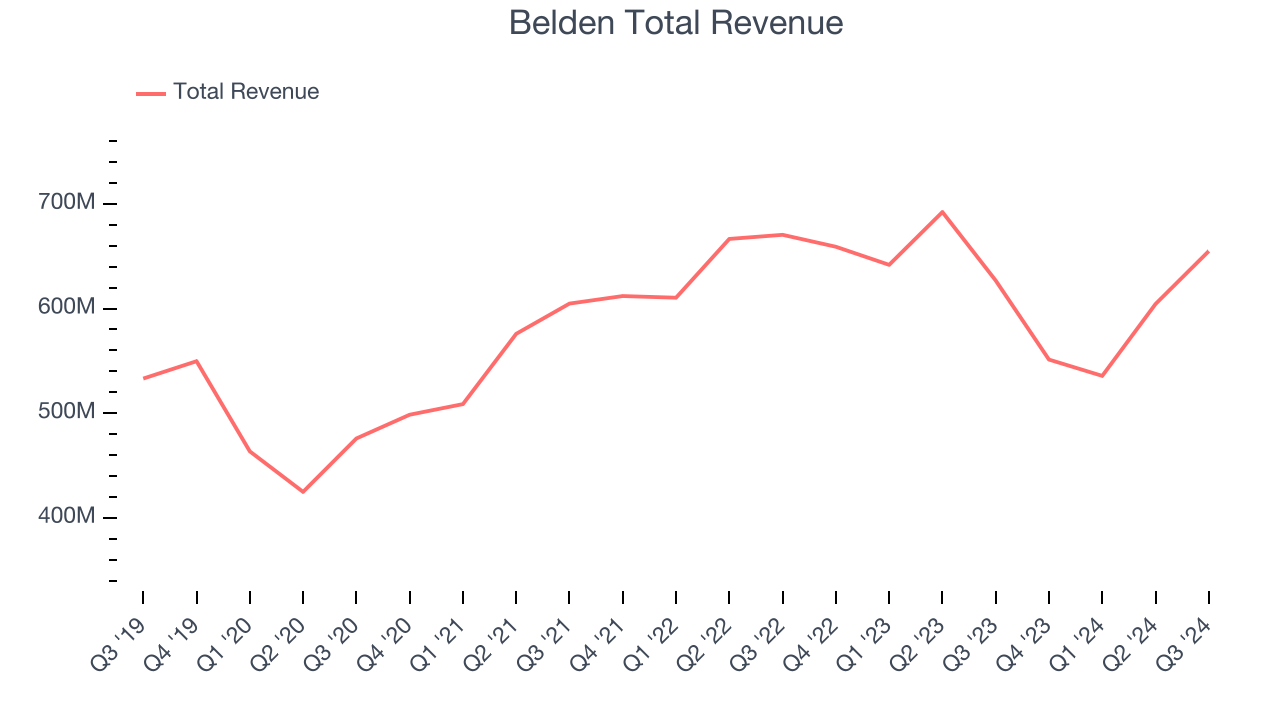
We at StockStory place the most emphasis on long-term growth, but within industrials, a half-decade historical view may miss cycles, industry trends, or a company capitalizing on catalysts such as a new contract win or a successful product line. Belden’s history shows it grew in the past but relinquished its gains over the last two years, as its revenue fell by 4.3% annually. Belden isn’t alone in its struggles as the Electronic Components industry experienced a cyclical downturn, with many similar businesses seeing lower sales at this time. 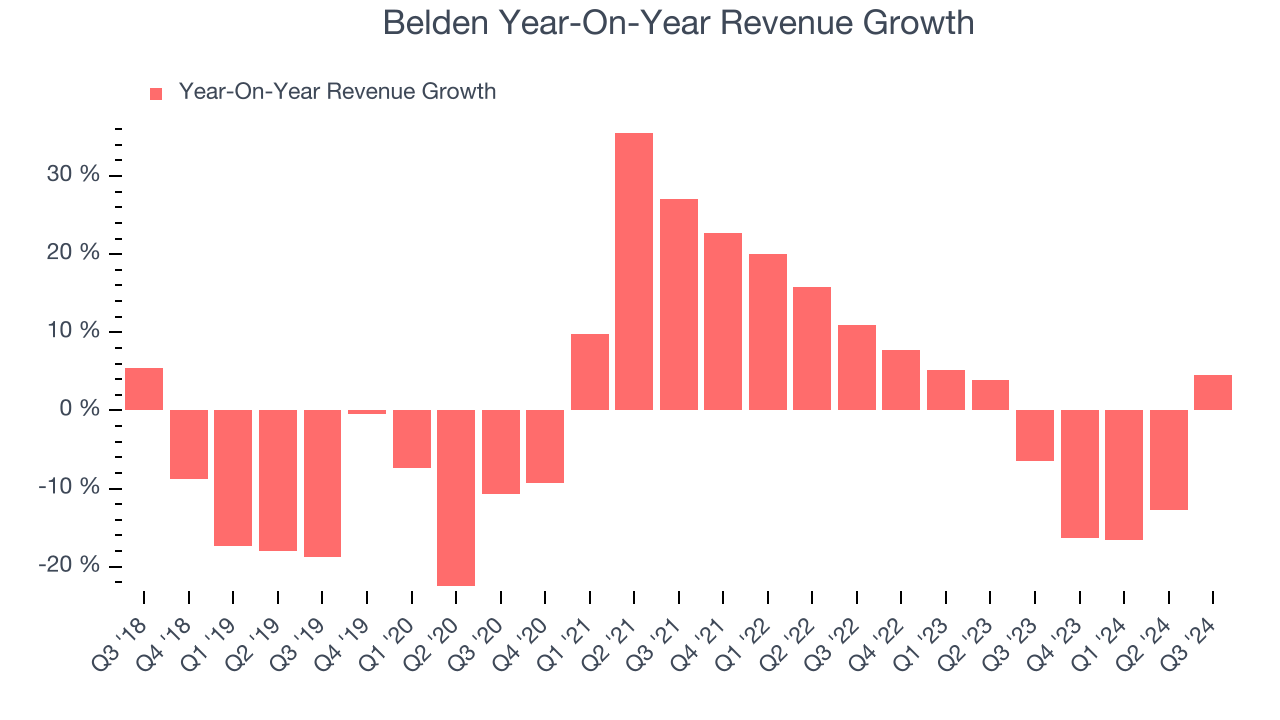
We can better understand the company’s revenue dynamics by analyzing its most important segments, Enterprise and Industrial, which are 48.8% and 51.2% of revenue. Over the last two years, Belden’s Enterprise revenue (network infrastructure and broadband solutions) averaged 3.6% year-on-year declines while its Industrial revenue (infrastructure digitization and automation) averaged 3.9% declines.
This quarter, Belden reported modest year-on-year revenue growth of 4.5% but beat Wall Street’s estimates by 1.7%. Management is currently guiding for a 18.4% year-on-year increase next quarter.
Looking further ahead, sell-side analysts expect revenue to grow 14.4% over the next 12 months, an improvement versus the last two years. This projection is commendable and illustrates the market believes its newer products and services will spur faster growth.
Unless you’ve been living under a rock, it should be obvious by now that generative AI is going to have a huge impact on how large corporations do business. While Nvidia and AMD are trading close to all-time highs, we prefer a lesser-known (but still profitable) semiconductor stock benefitting from the rise of AI. Click here to access our free report on our favorite semiconductor growth story.
Operating Margin
Belden has managed its cost base well over the last five years. It demonstrated solid profitability for an industrials business, producing an average operating margin of 11.3%. This result isn’t surprising as its high gross margin gives it a favorable starting point.
Looking at the trend in its profitability, Belden’s annual operating margin rose by 3.7 percentage points over the last five years, showing its efficiency has improved.
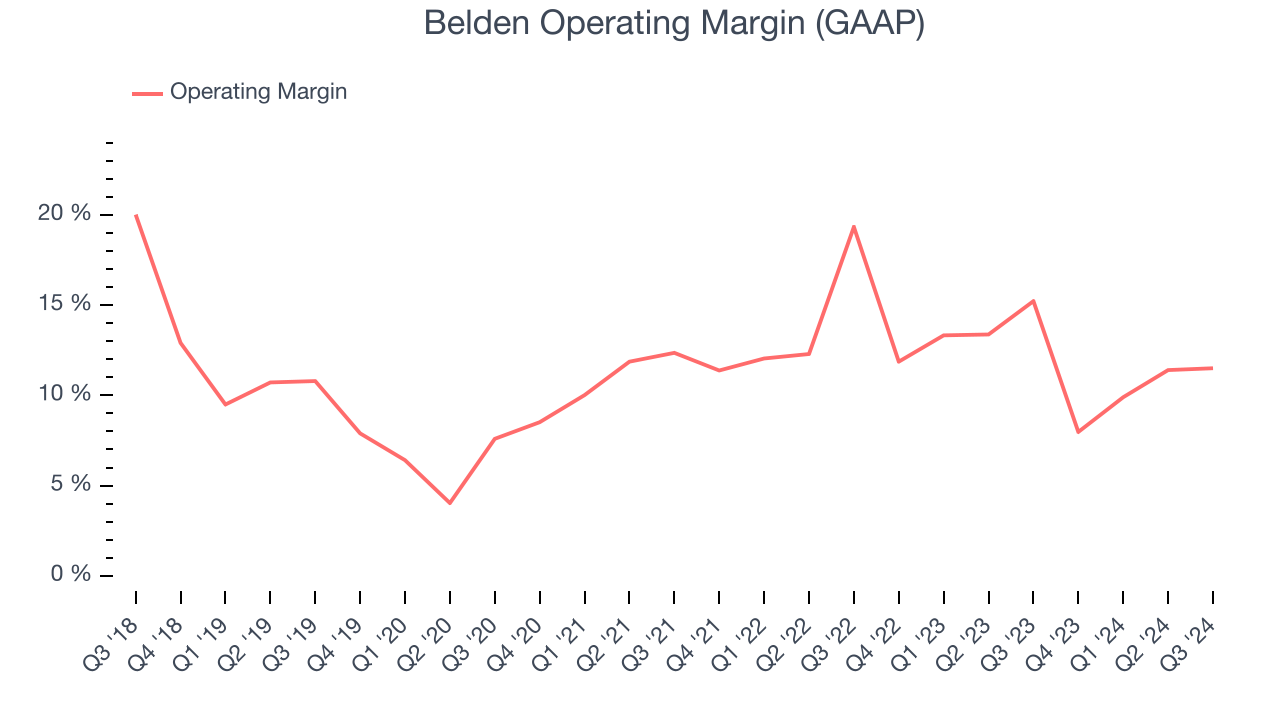
This quarter, Belden generated an operating profit margin of 11.5%, down 3.7 percentage points year on year. Since Belden’s operating margin decreased more than its gross margin, we can assume it was recently less efficient because expenses such as marketing, R&D, and administrative overhead increased.
Earnings Per Share
Analyzing revenue trends tells us about a company’s historical growth, but the long-term change in its earnings per share (EPS) points to the profitability of that growth – for example, a company could inflate its sales through excessive spending on advertising and promotions.
Belden’s EPS grew at an unimpressive 5.4% compounded annual growth rate over the last five years. On the bright side, this performance was better than its 1.9% annualized revenue growth and tells us the company became more profitable as it expanded.
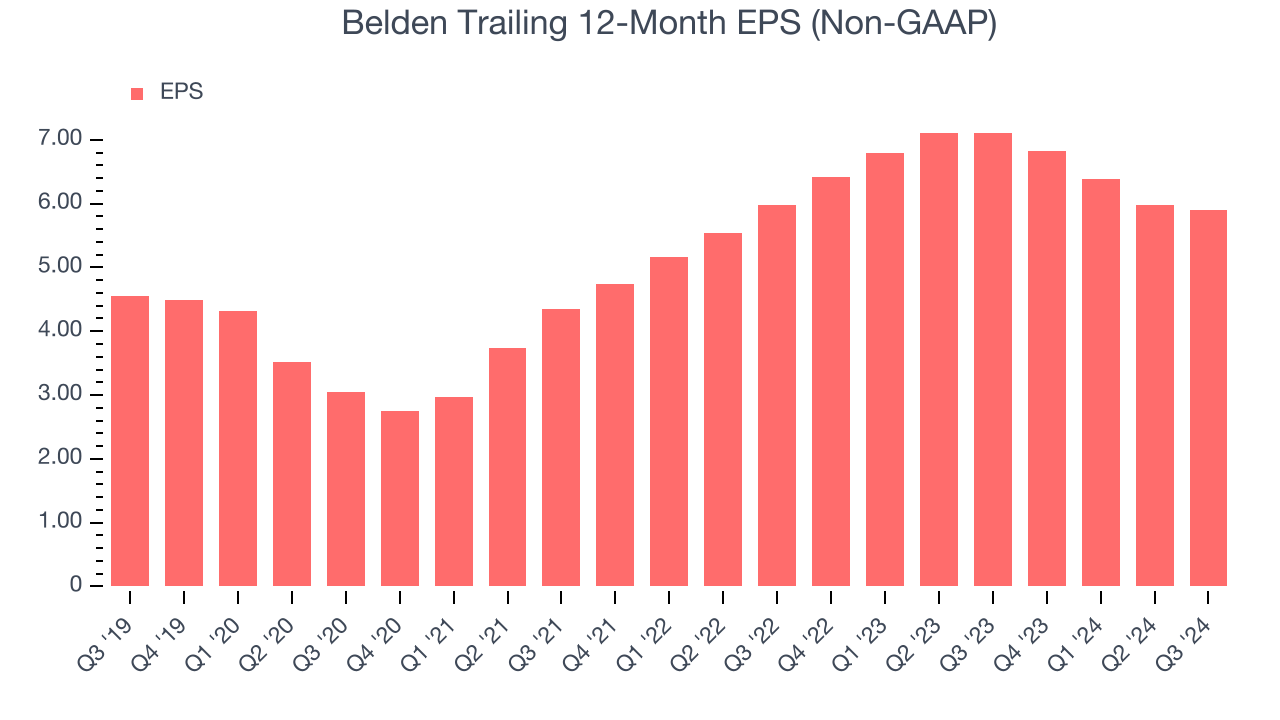
Diving into the nuances of Belden’s earnings can give us a better understanding of its performance. As we mentioned earlier, Belden’s operating margin declined this quarter but expanded by 3.7 percentage points over the last five years. Its share count also shrank by 7.2%, and these factors together are positive signs for shareholders because improving profitability and share buybacks turbocharge EPS growth relative to revenue growth. 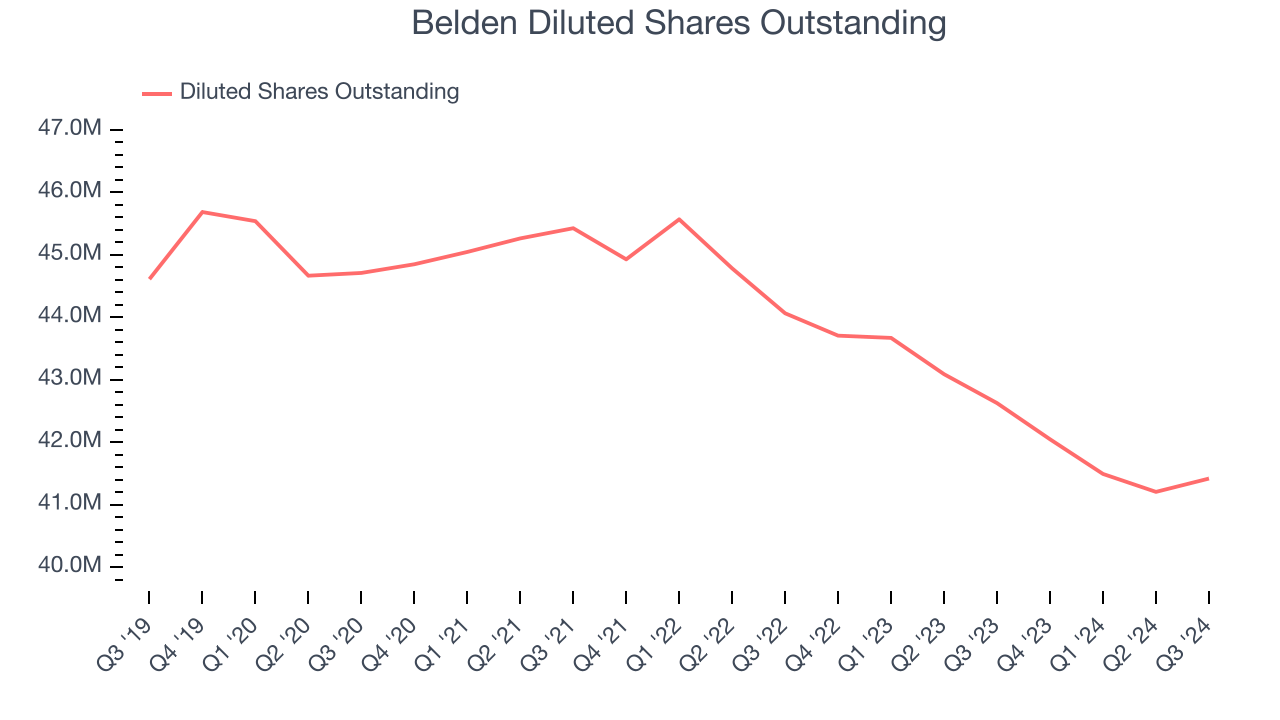
Like with revenue, we analyze EPS over a more recent period because it can give insight into an emerging theme or development for the business.
For Belden, EPS didn’t budge over the last two years, a regression from its five-year trend. We hope it can revert to earnings growth in the coming years.In Q3, Belden reported EPS at $1.70, down from $1.78 in the same quarter last year. Despite falling year on year, this print beat analysts’ estimates by 5.6%. Over the next 12 months, Wall Street expects Belden’s full-year EPS of $5.90 to grow by 22.9%.
Key Takeaways from Belden’s Q3 Results
We enjoyed seeing Belden exceed analysts’ revenue and EBITDA expectations this quarter. Overall, these results had some key positives. The stock traded up 2.1% to $120.10 immediately following the print.
Sure, Belden had a solid quarter, but if we look at the bigger picture, is this stock a buy? What happened in the latest quarter matters, but not as much as longer-term business quality and valuation, when deciding whether to invest in this stock. We cover that in our actionable full research report which you can read here, it’s free.

Quotes delayed at least 20 minutes.
By accessing this page, you agree to the following
Privacy Policy and Terms Of Service.



